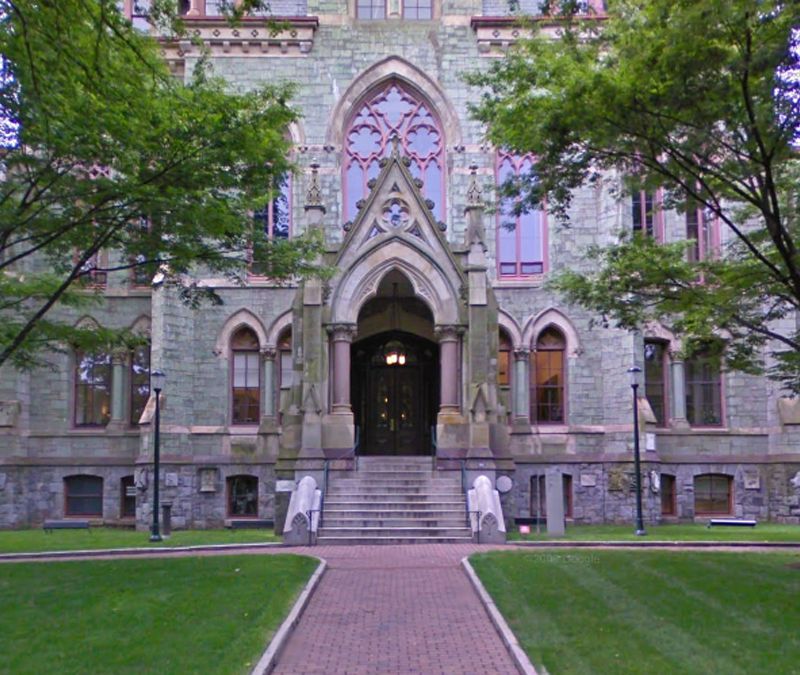- Rank 6
- Location Philadelphia, PA
- Enrollment 10644
- Admission Rate 5%
- Average Income $71672
- Tuition (in-state) $61710
- Tuition (out-of-state) $61710
- Average SAT 1523
- Average GPA 3.9
- White
34%
- Black
8%
- Hispanic
10%
- Asian
25%
- Native American
0%
- Non-Hispanic
0%
- Two or More
4%
- International
12%
- Unknown:
3%
Admission Requirements
- GPA: 3.9
- GRE: 320 (verbal) / 315 (quantitative)
- SAT: 1550 (combined)
- TOEFL: 100
- Application fee: \$75
- Interviews: Required for some applicants
Student Life
The University of Pennsylvania is home to over 20,000 students from all over the world. Students come from a wide range of socioeconomic backgrounds and academic interests. The university offers over 400 undergraduate majors and minors, as well as a variety of graduate and professional programs.
Penn's campus is located in the heart of Philadelphia, PA. The city is a major cultural and financial center, and offers a variety of cultural attractions, restaurants, and nightlife. Penn students have easy access to all that the city has to offer.
The university offers a vibrant and diverse student life. There are over 400 student clubs and organizations, and students are encouraged to get involved. The university also has a strong athletic tradition, and students can participate in a variety of sports teams.
Financial Aid
The University of Pennsylvania offers a variety of financial aid options to students who need it. The university meets 100% of demonstrated financial need for all admitted, first-year students who are US citizens or permanent residents. The average financial aid package for a first-year student is \$50,000.
Prospective students should visit the university's website for more information about admissions requirements, financial aid, and student life.
The University of Pennsylvania's (Penn) Technology and IT Services (TITS) department is responsible for providing the university community with the technology and IT services they need to be successful. TITS offers a wide range of services, including:
- Network services: TITS manages the university's network infrastructure, which includes the wired and wireless networks, as well as the data center. TITS also provides support for email, webmail, and file sharing.
- Desktop and mobile device support: TITS provides support for all university-owned desktop and mobile devices. This includes help with setting up devices, troubleshooting problems, and deploying software.
- Application support: TITS supports a wide range of applications used by the university community, including Microsoft Office, Google Workspace, and Zoom. TITS also provides support for custom-developed applications.
- Security services: TITS is responsible for the security of the university's information systems. This includes protecting data from unauthorized access, disclosure, modification, or destruction.
- Training and support services: TITS offers a variety of training and support services to help the university community learn how to use technology effectively. These services include workshops, webinars, and online tutorials.
TITS is committed to providing the university community with the technology and IT services they need to be successful. TITS works closely with the university community to understand their needs and to develop and implement solutions that meet those needs.
In addition to the services listed above, TITS also provides a number of other services, including:
- Telephone support: TITS provides telephone support for all university-related technology issues.
- On-site support: TITS offers on-site support for faculty, staff, and students who need help with their technology.
- Self-service support: TITS provides a variety of self-service resources, such as online tutorials and FAQs, to help the university community resolve their technology issues.
TITS is a valuable resource for the university community. By providing a wide range of technology and IT services, TITS helps the university community to be more productive and successful.
Technology and IT Services at Penn
The University of Pennsylvania's (Penn) Technology and IT Services (TITS) department is responsible for providing the university community with the technology and IT services they need to be successful. TITS offers a wide range of services, including:
- Network services: TITS manages the university's network infrastructure, which includes the wired and wireless networks, as well as the data center. TITS also provides support for email, webmail, and file sharing.
- Desktop and mobile device support: TITS provides support for all university-owned desktop and mobile devices. This includes help with setting up devices, troubleshooting problems, and deploying software.
- Application support: TITS supports a wide range of applications used by the university community, including Microsoft Office, Google Workspace, and Zoom. TITS also provides support for custom-developed applications.
- Security services: TITS is responsible for the security of the university's information systems. This includes protecting data from unauthorized access, disclosure, modification, or destruction.
- Training and support services: TITS offers a variety of training and support services to help the university community learn how to use technology effectively. These services include workshops, webinars, and online tutorials.
TITS is committed to providing the university community with the technology and IT services they need to be successful. TITS works closely with the university community to understand their needs and to develop and implement solutions that meet those needs.
In addition to the services listed above, TITS also provides a number of other services, including:
- Telephone support: TITS provides telephone support for all university-related technology issues.
- On-site support: TITS offers on-site support for faculty, staff, and students who need help with their technology.
- Self-service support: TITS provides a variety of self-service resources, such as online tutorials and FAQs, to help the university community resolve their technology issues.
TITS is a valuable resource for the university community. By providing a wide range of technology and IT services, TITS helps the university community to be more productive and successful.
Housing
The University of Pennsylvania offers a variety of housing options for undergraduate students, including on-campus residence halls, off-campus apartments, and houses in the surrounding neighborhood.
On-campus residence halls
The University of Pennsylvania has 14 residence halls for undergraduate students, each with its own unique personality and amenities. Residence halls offer a variety of room types, including single rooms, double rooms, and suites. All residence halls have common areas where students can socialize, study, and relax.
Off-campus apartments
The University of Pennsylvania also offers a variety of off-campus apartments for undergraduate students. Apartments are located in a variety of neighborhoods near campus, and offer a variety of amenities, including kitchens, laundry facilities, and parking.
Houses in the surrounding neighborhood
The University of Pennsylvania is located in the heart of Philadelphia, and there are a variety of houses in the surrounding neighborhood that are rented by students. Houses offer a more private living experience than residence halls or apartments, and they are often located in more historic neighborhoods.
Housing selection process
Undergraduate students who are admitted to the University of Pennsylvania are automatically considered for on-campus housing. Students who are interested in living in an off-campus apartment or house should contact the Office of Housing and Residential Life for more information.
Housing costs
The cost of housing varies depending on the type of housing option you choose. On-campus residence halls typically cost between \$1,000 and \$2,000 per semester, while off-campus apartments and houses typically cost between \$1,500 and \$3,000 per month.
For more information, please visit the Office of Housing and Residential Life website.
Sports
The University of Pennsylvania offers a wide variety of sports for students to participate in, including 33 varsity sports and over 200 club sports. The varsity teams compete in the Ivy League, and have won a total of 376 NCAA championships. Some of the most popular sports at Penn include football, basketball, baseball, and lacrosse.
The football team is one of the oldest in the country, and has won three national championships. The basketball team has also had a lot of success, winning two national championships and making 31 NCAA tournament appearances. The baseball team has won two Ivy League championships, and the lacrosse team has won three national championships.
In addition to varsity sports, Penn also offers a variety of club sports, including rugby, rowing, fencing, and ultimate frisbee. Club sports are a great way for students to get involved in sports without having to commit to a varsity team.
Penn also has a strong intramural sports program, with over 100 different leagues to choose from. Intramural sports are a great way for students to stay active and meet new people.
Sports Facilities
Penn has a number of state-of-the-art sports facilities, including Franklin Field, the Palestra, and Penn Park. Franklin Field is home to the football team, and has a capacity of over 50,000 people. The Palestra is home to the basketball team, and has a capacity of over 10,000 people. Penn Park is home to a variety of other sports facilities, including a track and field stadium, a swimming pool, and a tennis center.
Student Life
In addition to sports, Penn offers a variety of other student life activities, including student government, Greek life, and a variety of student clubs and organizations. Student government is a great way for students to get involved in the university community and make a difference. Greek life is a popular way for students to meet new people and make friends. There are over 40 different Greek organizations at Penn, so there is sure to be one that is a good fit for you. The university also has a variety of student clubs and organizations, so you can find something to interest you no matter what your interests are.
Conclusion
Penn is a great place to study and play sports. The university offers a wide variety of sports for students to participate in, and has a strong intramural sports program. Penn also has a number of state-of-the-art sports facilities, and a variety of student life activities.

Loading University of Pennsylvania on the map ...
Top Researchers on University Cube





